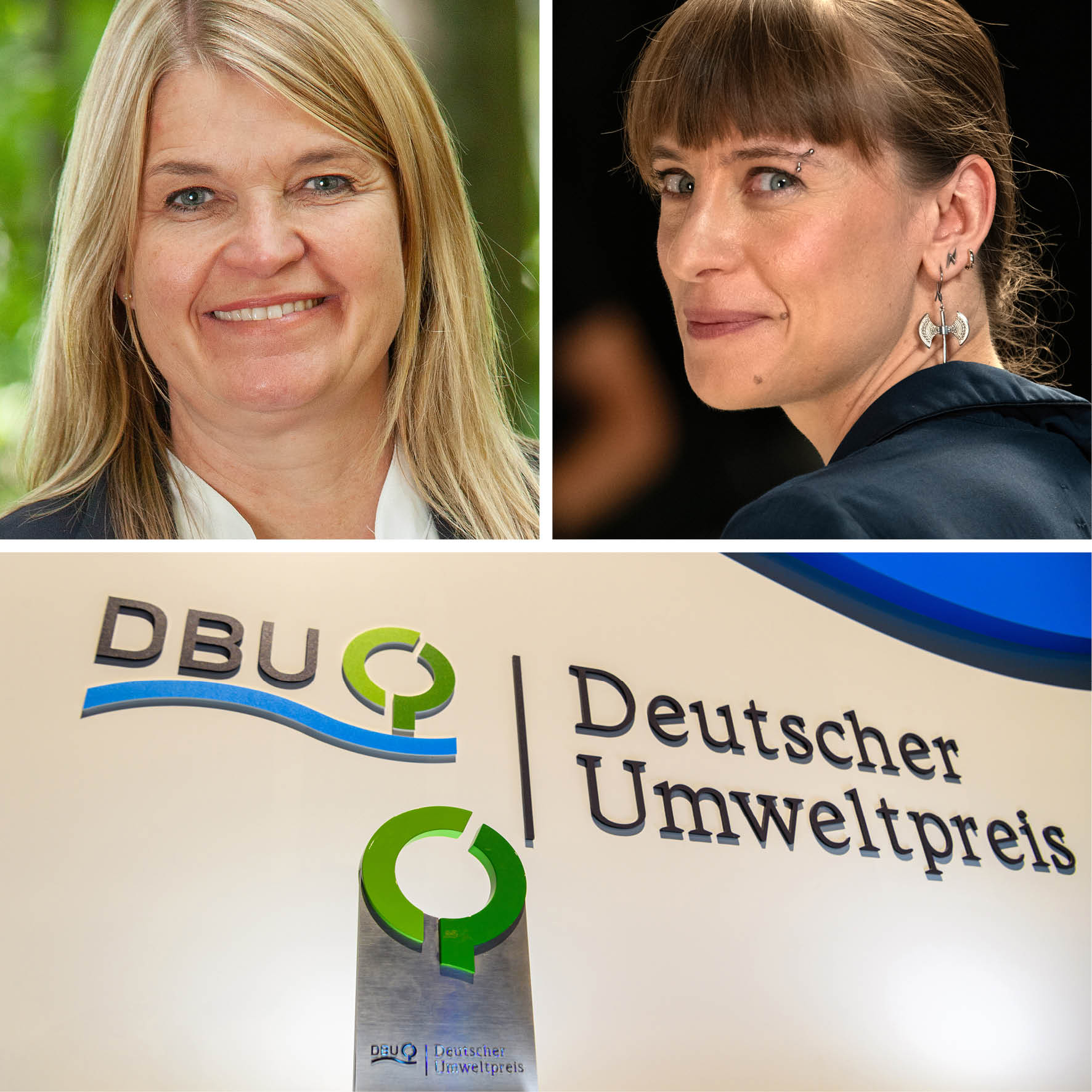DBU’s German Environmental Award for Climate Scientist and Wood Construction Pioneer
Osnabrück. The German Federal Environmental Foundation (DBU – Deutsche Bundesstiftung Umwelt) has chosen two women as the joint recipients of this year’s German Environmental Award – climate scientist Professor Friederike Otto and wood construction entrepreneur Dagmar Fritz-Kramer will share the prestigious accolade in its 31st year. The 500,000-euro award is one of Europe’s most highly renumerated environmental awards. The two award winners will receive the prize on 29 October in Lübeck from German Federal President Frank-Walter Steinmeier.

‘Both award winners are a true inspiration and motivation’
‘With the outstanding energy they have shown in their respective fields, both award winners have demonstrated that we cannot afford to lose any more time in the fight against the climate crisis,’ says DBU Secretary General Alexander Bonde. He believes that Friederike Otto and Dagmar Fritz-Kramer are achieving something significant. He says: ‘They are a true inspiration and motivation for us to learn from the impacts of global warming, which are already evident today, and to continue implementing more and more environmental and resource protection measures so that our planet remains a habitable place.’
Connection between climate change and weather
According to Bonde, Friederike Otto from Imperial College London is an ‘outstanding climate scientist who has conducted pioneering research and has made a significant contribution to climate science’. The field, known as attribution science, investigates the link between climate change and weather. For example, ‘whether there are connections between climate change and extreme weather events such as heat waves, droughts, floods and heavy rainfall,’ as the DBU Secretary General explains. In 2015, the now 41-year-old climate scientist founded the World Weather Attribution (WWA) initiative together with her Dutch colleague Professor Geert Jan van Oldenborgh, who has since passed away, and played a leading role in examining the attribution of extreme weather events to human-caused climate change. According to Bonde, there are three key parts to Otto’s work: the rapid publication of sound scientific knowledge regarding the connections between global climate change and regional extreme weather; research into the causes, as well as presentation of the local impacts of the global climate crisis; and proposals for effective adaptation measures. Bonde: ‘The presentation of strong research in real time is not only an innovative approach that enables balanced discourse on climate change, impacts and countermeasures, but is also an effective means of countering false news. All of this makes global warming real and tangible.’ According to Bonde, the work undertaken by Otto and her team ‘gives people the chance to act with foresight in order to arm themselves against the climate crisis’. A recent WWA study carried out in July attracted considerable attention. Its conclusion was that, without human-caused climate change, the heat waves experienced this year in North America and Southern Europe would not have been possible. Bonde: ‘This clearly shows the need for heat action plans and for the abandonment of fossil fuels as soon as possible, which contribute significantly to heating up the planet.’
‘Source of ideas for new approaches in the construction sector’
Dagmar Fritz-Kramer is the managing director of the family company Bau-Fritz GmbH & Co.KG, based in the Allgäu region of Germany and known as Baufritz for short. In the words of the DBU Secretary General, she is a ‘source of ideas for new approaches in the construction sector’. Bonde adds: ‘She and her company are a true driving force of industry and the changes shaping the construction sector.’ Baufritz almost exclusively uses wood for new buildings, renovations and extensions, a material described by Bonde as ‘an excellent means of climate protection, as it stores large amounts of carbon and thus prevents the formation of climate-damaging carbon dioxide’. According to Bonde, the construction sector has ‘a key role to play if Germany is to become climate neutral by 2045 as planned’. And with good reason: in Germany, the construction sector is responsible for around 40 per cent of the total emissions of climate-damaging greenhouse gases such as carbon dioxide (CO2), which amounted to 746 million tonnes in 2022, according to the Federal Environment Agency. Urgent renovation of Germany’s old buildings is therefore needed, as almost two-thirds of the approximately 21.4 million properties in the country fall into this category. Baufritz’ managing director Fritz-Kramer believes there is a responsibility on the part of the construction industry here, as it ‘accounts for almost two-thirds of rubbish in waste dumps in Germany’. The 52-year-old believes that renovation, recycling and resource conservation are ‘essential’, particularly as sand has now become a rare commodity. Baufritz mainly processes domestic spruce wood and, according to its own information, achieves CO2 savings of around 12,000 tonnes every year through its construction projects. ‘We need people like Ms Fritz-Kramer, who, with their foresight, courage and business acumen, are implementing sustainability, environmental protection and resource conservation initiatives. This is the only way that we will achieve our climate goals,’ says DBU Secretary General Bonde.
A fourth-generation family business and an internationally renowned climate scientist
Dagmar Fritz-Kramer is a qualified engineer and has been a managing partner of the family business since 2004. The company was founded in 1896 and is now in its fourth generation. The medium-sized company with around 500 employees has its own Research and Development department and has more than 40 patents and property rights to its name. Climate scientist Friederike Otto is one of the lead authors of the Sixth Assessment Report of the Intergovernmental Panel on Climate Change (IPCC). The physicist and doctor of philosophy received an Excellence Professorship from the Petersen Foundation in November 2022. As co-founder of the WWA, she was included in the prestigious Time 100 list as one of the 100 most influential people in the world.
Photos according to IPTC standard for free publication at www.dbu.de